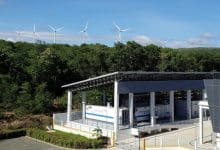Thailand’s EGAT targets biomass, hydrogen to cut CO2 emissions

The Electricity Generating Authority of Thailand (EGAT) is endeavouring to combat climate change by adopting alternative fuels to replace coal in its power plants. Partnering with the Forest Industry Organisation, a study is underway to identify fast-growing plants suitable for conversion into biomass fuel. This initiative falls within EGAT’s strategy for long-term CO2 reduction, as confirmed by Chaiwut Lakmuang, the assistant governor for sustainability management at EGAT.
Chaiwut emphasised the importance of obtaining international standard certification for biomass fuel to ensure its effectiveness as a coal substitute. The collaboration between the two government agencies has resulted in a signed memorandum of understanding in their joint effort to pinpoint ideal locations for growing these plants.
The Mae Moh power plant in Lampang, a northern province of Thailand, is targeted by EGAT to have 2% of its coal replaced with biomass fuel. This will significantly contribute towards reducing CO2 emissions, explained Chaiwut. The growth of plants not only absorbs CO2 but also creates job opportunities and additional income for local communities, reported Bangkok Post.
EGAT’s subsidiary, Electricity Generating Plc (EGCO), has also been exploring sustainable alternatives by using hydrogen as a fuel source for its Linden Cogen Unit 6 power plant in the United States. The 172-megawatt plant in New Jersey has adopted a hydrogen blending programme that utilises a combined combustion of natural gas, hydrogen, and refinery off-gas, which is a by-product of crude oil refining.
This method of utilising off-gas containing hydrogen from a nearby oil refinery, blended with natural gas, improves operational efficiency and reduces CO2 emissions by approximately 10% annually, announced Thepparat Theppitak, president of EGCO.
National oil and gas conglomerate PTT Plc has also shown interest in hydrogen as a sustainable fuel source. The company has signed a memorandum of understanding with EGAT and ACWA Power, a Saudi Arabia-based renewable energy specialist, to co-develop green hydrogen. This green hydrogen, produced by using renewable energy to split water molecules into oxygen and hydrogen, can be used to power generation and manufacturing processes.
Latest Thailand News
Follow The Thaiger on Google News:


























